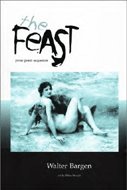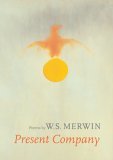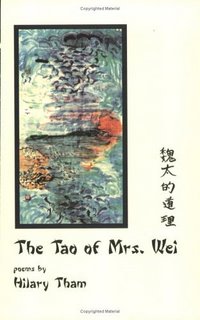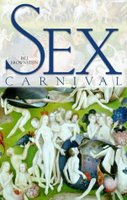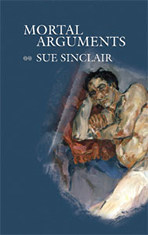Churlsgrace by William Hathaway.
Gainsville: University of Florida Press, 1992.
97 pages. $12.95 paper. ISBN 0-8130-1126-4.
In a previous incarnation, I wrote a bi-weekly book review column, called "On the Shelf," for an arts tabloid out of Albany, New York. I was not the only one who found it astonishing (for reasons that will momentarily become clear) that the column lasted some six months (from 1992-3). There is nothing so attractive to a group of local poets, however, as a column in which their names might appear at any moment -- or the names of other local poets of their acquaintance. "On the Shelf" was surprisingly popular.
The sponsor of the column, however, soon began to press me to review a particular book. The shelf referred to in the title of the column was the "Local Interest" shelf of his independent book store. I imagine he only felt that, given his sponsorship, his favorite book should receive notice.
At first I fended off his imprecations. I had perused the book more than once during my stops at his shop, looking for books to review, and each time had returned it to its place. My idea had been to review no book that I felt had no redeeming qualities. Every review would present a bit of yin no matter how much yang.
When I could no longer stave off the gentle pressure -- which had pretty much grown into a demand -- the stage was set for the end of my column. I left the shop with the book determined not to alter my opinion of it one iota in order to please an advertiser. I would have to hope that my impression of it was mistaken. The profound ethics of tabloid book reviewing were at issue.
As fate would have it, the book was still worse than I had thought. Saddened, I set about writing a review that may have gone down in Albany literary history. The staff had grown out of the habit of checking my copy. The review went to press. I was called upon the carpet by a disheveled, unshaven, slightly trembling editor with bloodshot eyes. Advertising revenues were mentioned. Several days later the advertising associate mistakenly set the dog on me when I walked in the door of the office/editor's apartment and I was quite badly bitten.
The review the reader will find below was the review I turned-in following the above events. It was to run in two consecutive issues thus the parts 1 & 2. I will spare the gentle reader a description of the state of the unfortunate bit of copy when it appeared. Perhaps he or she will understand when I say that there is nothing in Stephen King to compare to it. A brief exchange of telephone calls ensued that only extended the comparison. There remained nothing to do but to resign.
Happily, a regional magazine, The Eye on Saratoga, scooped me right up. The Eye was a spiffy little fashion magazine which was looking for a features writer and a wider scope. It was even a paying gig! But fate intervened yet again. There was a very pretty assistant editor and a Hunter Thompson inspired piece on opening day at the flat track. Six months after becoming ace reporter I once again saw the wisdom of resigning. Never did get paid for the flat track piece. But then that's another story.
So then, William Hathaway's Churlsgrace still being available in the publisher's stock, and in distribution, I take this somewhat belated opportunity to present it to the readers of Eclectica. (Does anybody have a calendar? I haven't been reviewing here for six months yet, have I?)
--------------------------------------------------------------------------------
The Vulgar Tongue: Part 1. In which the reviewer all too briefly surveys the history of profane literature by way of setting the stage for a review of William Hathaway's volume of poetry Churlsgrace.
Sometime about 1285, Dante Alighieri wrote a sonnet ("A ciascun' alma presa e gentil core...") requesting that his fellow poets provide him the interpretation of a dream he had concerning his beloved. On and off during literary history it has been customary for poets to have challenge matches upon a theme. This was the reason the poet wrote asking for interpretations: a pretext to compose a group of poems on a given theme (then called a Tenzone).
Among replies from the high names of the Stil Nuovo (this poetic cadre referred to theirs as the "New Style"). Cavalcante and Cino da Pistoia sent sonnets finding good omens in the symbolism of the dream. Among the names history has largely forgotten, another Dante replied. Dante da Maiano—a respected elder statesman—included his own sonnet in which the following lines are found:
...che lavi la tua coglia largamente,
a ci¨o che stinga e passi lo vapore
lo quale ti fa favoleggiar loquendo...
Even scholarly works on Dante, claiming to provide literal translation of texts from the time, seem incapable of getting the point of these lines. Explanations from the finest minds inevitably settle on them as a description of some medieval medical practice on a par with bleeding the patient with leeches. A quick prose -- and actually literal -- translation makes clear that the notion is ludicrous:
...wash your balls liberally, until you grow pale and a vapor is emitted, the which will make you babble like a fool...
Da Maiano has told the immortal Dante that the cure for love-sickness is to jerk-off. He uses medical terminology to enhance the joke, and goes on to say that, after the cure, a young man gains a wiser perspective upon just what is this thing "love."
Since the time of Aristophanes -- the Greek playwright -- we have a continuous record of this brand of literary realism. His play,
The Frogs, opens with the god Dionysos and his slave Xanthus discussing Xanthus' threat to defecate in the middle of the road if not relieved of some of his load. Dionysos asks to be spared the spectacle because he does not feel like puking at that particular moment. All of his plays are filled with this kind of exchange.
Diogenes -- one of the great Greek philosophers of the generation after Aristophanes -- was, for much of his life, a panhandler on street corners and perennial houseguest. Legend has it that he directed that he be hung up for a scarecrow after his death (or maybe he just wasn't all that popular and the story a lame excuse for dumping his carcass in a field). In a Guy Davenport translation, from the book
Thasos and Ohio (1986), Diogenes boasts:
When some strangers to Athens asked me to show them Demosthenes, I gave them the finger, so that they would know what it felt like to meet him.
Our common picture of the Greeks obviously glosses over a few things.
Chaucer -- in the one Canterbury Tale not in your modernized high school text, "The Miller's Tale" -- shows us a picture of the common man of the time in such lines as "...this Nicholas was risen for to piss..." and "...Absolon hath kist hir nether ye...," etc. In one of the finest jokes in literature, Nicholas hangs his "ers" out a window where a clerk, expecting his beloved in the dark, proclaims its sweet aspects. But, then, Chaucer tells the tale best:
This Nicholas anon leet flee a fart
As greet as it had been a thonder-dent...
The Canterbury Tales were a favorite after-dinner entertainment with the nobility of the time. No one recounts to us that the ladies were asked to leave the room before this one was told. This kind of thing was a normal component of life.
The film versions of Jonathan Swift's Gulliver's Travels are family fare. Few are aware that the author is perhaps the most scatological writer in the English language (to be fair, it probably was a sign of encroaching syphilitic dementia). The actual Gulliver's Travels is filled with sweat (bathing had yet to become commonplace), flatulence and excrement.
In chapter 5, the "Voyage to Laputa," Gulliver describes the Academy of Lagado "wherein the Professors employ themselves." It may be a lampoon of the Royal Academy of Science then newly created in London.
One professor had discovered a treatment for "the Cholic." A bellows with an eight inch nozzle was inserted into the patient and used to inflate the intestines. Then, the doctor "clapping his Thumb strongly against the Orifice of the fundament," the trapped gas would make its escape. The method was demonstrated upon a laboratory dog, and:
...the animal was ready to burst, and made so violent a Discharge, as was very offensive to me and my Companions. The Dog died upon the Spot, and we left the Doctor endeavouring to recover him by the same operation.
The names Villon, Rabelais, Skelton, Shakespeare and Twain bring to mind hundreds of other hilarious and well-written examples of profane realism -- of profanity. Other names are less well known.
In Shakespeare, ordinary peasants are portrayed in brief scenes to provide relief from heavier themes. In the old English dialect such people were called "ceorls": freemen without rank. In the Old French ceorl had become "carl" and then "charal." The English eventually borrowed the French version of the word, during the Middle Ages, as "churl."
The playwright saw the freeman as a combination of intelligent and ridiculous. He could not read or write or reason properly. He was nevertheless somehow -- while he rolled about in the piss and mire -- loveable and at times smarter, in his own way, than "his betters."
Today's churl has a public education to make him more or less able to reason, less comical. He may achieve the rank of nobility through capital investment and luck. The impressive trappings are within his reach and held out to him as positive reinforcement to produce.
William Hathaway, however, has done well to title his latest book of poetry Churlsgrace. While other trades have advanced, the poet is still a "freeman without rank" and the butt of humor. Moreover, Mr. Hathaway loves an Elizabethan style of low poetry and makes it modern excellently well.
The Vulgar tongue: Part 2. In which the reviewer explores William Hathaway's normal humanity and various and sundry bodily excretions and awards him a bronze-medal in regular poetry.
William Hathaway's connection with the profane is like Eliza Doolittle's to her cockney past. He has received a solid education, and, though still a churl at heart, there is no way to go entirely back.
Often the poems in this volume are written from the perspective of a young boy. "For the Hell of It" draws an interesting parallel between the schoolyard and the Chanson de Roland. "Looser Talk" is a flashback to an innocent childhood lived on the heels of World War II.
Others are from the perspective of a blowsy poet and professor of literature, which is to say, an overgrown, cherubic man-child. "O My Soul" and "Below Houston" -- from among the longer poems at the end of the book -- are in this vein.
"Critical Theory" is another such poem and one of the finest in the book. It is about the testiness of men towards women, which, were we entirely superior to it, we would call "fear." An uncle's humorous ditty is recalled. St. Jerome wanders in and out, until, at the end, he instructs wary young men:
If you should spot a woman ambling up
the path to the grotto where you're
praying, mortifying your flesh against
hard-ons and writing books, you should
run out and chunk rocks at her.
Yet, no matter how decidedly masculine, these poems never take their rampages too seriously. The battle of the sexes is dealt with across a wide range and as an endearing trait of a hapless race. St. Jerome is amusing. We can imagine him being played by John Cleese in some Monte Python film.
In most of the poems there is this sense that the human race is blissfully unaware of its foibles. Even in "The Rising Sun" the executions of Chinese dissidents are not taken too seriously. It is a telling statement that he has foregone drawing a wrenching portrait for us. He has taken pictures of the normal places and remembers the ching-ching of the bicycle bells as riders try to clear a path.
Hathaway is capable of only normal angst. He knows that all of the world does not lie in the balance of most men's quarrels, least of all his own. This gives him human dimensions and a correspondingly unheroic body. He can hardly leap up to the high style without, in the next stanza, wallowing in correction. His bravado is always self-deprecating.
Within a real-sized life, love is fumbling and frustration. With a body of flesh, sex is bulbous and a little flabby:
...My swollen
genitals ached in pegged jeans,
straining to unfurl monstrous petals...
The shameless loss of self-control which slaps together sweating bodies and elicits groans and farts is "seeded in fecund muck."
The poem "Below Houston" is about pulling over to the side of the road to empty his bladder of beer. A drunken, and very human, poet (Who can be heroic while urinating?) reflects on life. Both he and a Venetian character from Shakespeare, we learn, are circumcised. In defense of his breach of decorum, he tells us:
I've also seen girls
squat in uric beams squinting up at black
windshields...
Guy Davenport, in another of his books, Every Force Evolves a Form, informs us that it was Noah Webster whose dictionary erased the body from our language:
I still can see him only as Uriah Heap sniffing out naughty words in the Bible, deleting them, and congratulating himself on being more genteel than God.
For nearly one hundred and fifty years afterwards, literate people did not answer any of natures calls (a painful situation, one supposes).
Predictably, the reaction to so unendurably protracted a constipation was a shit-for-shit's-sake spree which is powerful still. The author of Churlsgrace gives us a welcome moment of just being regular. A respite in which life is no better or worse—no more crude or repressed—than life.
An overgrown man-child, a collector of scraps and literary anecdote, a literary mongrel: these are the characteristics which make this churl almost "Elizabethan." Mix in a little mucous and spittle and the picture is complete.
Yet this is an educated -- a displaced -- churl also, and, beside Jake LaMotta we find Jacques Lacan, among Chinese peasants Tacitus speaks. References are scattered throughout to Keats' urn, the biblical Ruth, Hopkins' inscape, Plath's insecurity, etc.
The authors that come to mind while reading this volume are minor figures, from an earlier age, who are today little read, but still impress: Greene, Harvey, Nashe. While the giants roared, they pleased with a normal humanity. He, like they, straddles two worlds. Like they, he tends to moralize and with only normal expectations of the reader.
Throughout Churlsgrace there is this mix of low and high. The more insightful the combination, the better the poem. The game is played close enough to the edge, however, that one misstep can make a poem into a junk-pile.
It has been said of Auden that he wrote many poems that were failures but none that were uninteresting. In this, Hathaway reminds us of no one so much as that craggy-faced don. The image of the junk-pile explains why we value their failures even more, at times, than their successes.
Call him a bronze-metal poet who occasionally stumbles upon a multifaceted image such as the description of running past flowers included in the poem "Close Call," or writes so fine a poem as "Grief in Early Spring" where,
You might say a merry chuckle
in the storm drains is the sun's
laughter...
Around these occasional moments of grace bumbles a human being intelligent enough to appreciate himself for what he imperfectly is. And that being writes a damned interesting poem.
Gilbert Wesley Purdy's work in poetry, prose and translation has appeared in many journals, paper and electronic, including: Jacket Magazine (Australia); Poetry International (San Diego State University); The Georgia Review; Grand Street; The Pedestal Magazine; SLANT (University of Central Arkansas); Orbis (UK); Eclectica; and Quarterly Literary Review Singapore. His Hyperlinked Online Bibliography appears in the pages of The Catalyzer Journal. This review first appeared in Eclectica.
